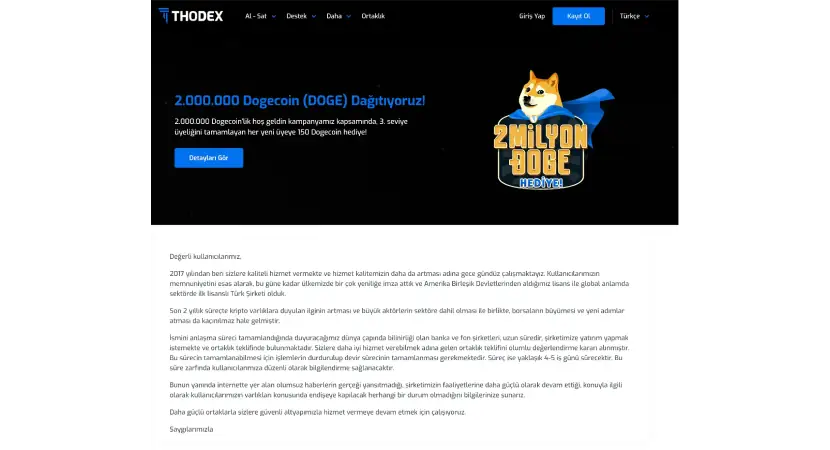Crypto attracts visionaries. Every now and then, a self-anointed charismatic voice emerges, promising a new path in the world of crypto with insane returns. These fake CEOs then usually run away with your investments in a textbook rug-pull scheme - sometimes, authorities catch up with them, but often their crimes go unpunished. These incidents tarnish the reputation of the entire crypto industry, reinforcing skepticism and keeping new, major players away. One of the most notorious stories? The epic collapse of the Turkish crypto exchange Thodex, led by Faruk Fatih Özer crypto a Turkish entrepreneur and former CEO of a failed crypto exchange called Thodex who was sentenced to 11,196 years in jail after Thodex suddenly shut down in 2021, blocking 400,000 users from accessing their funds and causing an estimated $2 billion in losses. Özer fled to Albania but was arrested in August 2022 and extradited to Turkey in April 2023. In September 2023, he was convicted of fraud, money laundering, and establishing a criminal organization.
Faruk Fatih Özer: Life Before Thodex
Born in 1994, Faruk Fatih Özer took an interest in everything technology and software programming at an early age. As a teenager, he worked at his parents’ print shop in the city of Kocaeli and kept talking about running his own business at one point. He was so adamant about his ambitions that he dropped out of high school after two years, saying that formal education wouldn’t help him achieve his goals. Well before turning 20, Özer kicked off several tech ventures like Inline Teknoloji and Game Bridge, which produced mobile apps and games. These were ventures co-created and managed with his brother, Güven. The duo didn’t quite invent the wheel but found the secret sauce to creating addictive apps. Some of their ideas included pre-Instagram filters for photos and gambling games, gluing thousands to the screen. “I started to sell almost every product that I thought could make a profit on the internet,” he once said. But being a tech entrepreneur, no matter the ambition, was pretty challenging in Turkey in the 2010s. This is where Özer saw an opportunity. In Turkey, people traditionally kept a lot of their savings in USD out of fear of the volatility of the local currency, the Turkish Lira (TRY). “During conversations with friends, we realized the deficiencies in the cryptocurrency exchange sector in Turkey and that the market was open to new players”, said Özer.
Getting Into Crypto & Starting Thodex
Özer’s timing couldn’t have been better. In 2017, TRY took a massive hit due to the country’s unorthodox economic policies. Suddenly, having your savings in the local currency made zero sense. Coincidentally, 2017 was also the first bull run of BTC: the cryptocurrency’s value shot up from $9,000 to $20,000. With no major crypto exchange in Turkey, absolutely no regulation around crypto, TRY hitting rock bottom, and BTC shooting to the skies, the writing was on the wall. Özer soon founded Thodex, one of Turkey’s first crypto exchange platforms. He did this at the age of 23 with only 40,000 TRY (or $11,000 at the time). His siblings also joined the fun: his sister Serap took the role of accountant, and his brother Güven also lurked about, although he didn’t assume any official title. And this is how the Faruk Fatih Özer crypto story began. He took a page out of Silicon Valley crypto preachers’ books: he put up billboard ads at bus stations, installed the country’s first BTC ATM in Istanbul, started airing commercials on TV, and featured well-known Turkish celebrities in the exchange’s ads. Özer gave crypto a face in a country heading into economic turmoil. Those attuned to innovation and technological advancements (and still having any fortune) heard Özer’s gospel, and the US Treasury’s Financial Crimes Enforcement Network granted a money service license to Thodex in 2020, catapulting Özer to the stratosphere of Turkish society. Most crypto projects fail, but that would not happen with his.

Simge Sağın was one of the many celebrities Özer used to promote Thodex in a photoshoot
Özer became a recognized figure: he was invited to the board of Blockchain Turkey, started attending private meetings with the highest ministers of the country, and frequently appeared on the news. Around this time, the total transaction volume was hitting $3 billion, with over 400,000 users trading their assets. While these numbers are respectable on a local scale, Thodex was still outgained by competitors BtcTurk and Paribu, with each exchange logging higher transaction volumes and more people trading. Still, Thodex and Özer’s ad campaigns - combined with the volatility of TRY - did an astounding job. In just a few years, Turkey became a world-leading country in crypto adoption, with 47% of the adult population holding assets in some kind of cryptocurrency. But that’s about all the positive outcomes of Özer’s deeds. Behind aggressive marketing tactics like Dogecoin giveaways and the already mentioned celeb cameos in TV spots, the Özer clan has been actively engaging in massive fraud and money laundering activities. While running their last Dogecoin campaign, the Özers were busy preparing for the exchange’s “unexpected” collapse. They faked trade volumes to attract new investors while real users’ investments were allegedly siphoned into shell accounts. As it turned out later, the family didn’t account for user assets properly, and they had also been transferring large sums out of the country well before Thodex would collapse.

The last Thodex campaign before the collapse promised new signups a total of 2 million Dogecoins.
The end of the Dogecoin giveaway sent down a ripple effect on the community: April 20, 2021 , was dubbed as “Dogeday” because fans expected the price to go up. And the price did go up, but there was a catch.
Where It All Fell Apart
Thodex’s collapse was inevitable for multiple reasons, but before we study the criminal activities of the Özers, we have to take a look at a larger player on the brink of collapse: Turkey and its economy. Earlier in April, Turkish President Recep Tayyip Erdoğan was handed tough news: the Turkish lira was at a historical low, and his approval ratings showed a similar tendency. Turkey’s Central Bank announced a ban on the use of crypto for purchasing goods and services. The decision sent shockwaves through the community: BTC’s value dropped by 4.6%, while the president announced that cryptocurrencies undermine confidence in the TRY. On April 20, the price of Dogecoin climbed by 20%; BTC prices soared to $63,000; and trading volume on Thodex was a record-high $538 million. But the bounceback was fragile, and he knew it was the last chapter in the Faruk Fatih Özer crypto saga. Suddenly, users started noticing disruptions in their transactions, to which Thodex said that they were under a cyber attack. Just within a day, all trading halted on Thodex: users couldn’t access their accounts anymore, and the website posted a cryptic announcement saying it was “temporarily closed”. Somewhere at a boarding gate, Faruk Fatih Özer got on a flight with over $2 billion worth of cryptos in his pockets.

What a difference a day makes: Thodex promoting the Dogecoin giveaway on April 20 (top) and a hazy message claiming that the news online about the collapse is not true and everything should return to normal in a few days (bottom).
It soon became obvious that tens of thousands of people had been scammed in what became the largest rug pulls of Turkey’s crypto history. Following user complaints, officials began investigating, and within a month, the first victim of the rug pull was held. After realizing that users could not access their funds, financial crime agents froze all assets on Thodex. Arrest warrants for 82 suspects, including Özer, were issued, and soon enough, everyone was caught except for Faruk Fatih Özer. In the next couple of months, prosecutors found out that Özer had refunded some of the victims, possibly out of remorse. In one of the saddest twists in the Faruk Fatih Özer crypto story, this didn’t stop many victims from committing suicide after losing all their life savings. As one victim of Özer’s rug pull says, he attempted suicide 3 times as he couldn’t bear living with the shame. He’s now come to terms with losing over $100,000 and works as a security guard to make ends meet, but the psychological damage may never be healed. There’s contradicting evidence if Özer refunded any of the victims.
He later claimed to have emptied his hardware wallet to repay victims before tossing it into the Ionian Sea - something which remains unverified. His lawyer, Sevgi Erarslan, also said that they facilitated partial repayments totaling approximately 185 million TRY (around $10 million at the time) to over 1,000 victims. The Public Prosecutor’s office wasn’t lazing around in the meantime. Out of the 82 suspects, 21 were indicted for their crimes, facing up to a grand total of 40,564 years in prison. With parole eligibility, each criminal was bound for 80 life sentences each or over 1,900 years in prison. The court determined that the suspects lured their victims with deceptive marketing and then stole their assets and converted them into gold and other cryptocurrencies.
Finding Özer
With all 20 criminals behind bars and awaiting trial, the Turkish public was on pins and needles. Where’s the main perpetrator? Is he still in Albania? Has he escaped to a banana republic? Was he caught by even more serious criminals and buried in a nameless grave? The truth proved to be even more absurd. Sevgi Erarslan, a lawyer Özer’s father hired originally to refund the victims, posted a shocking tweet, saying that she’d refund anyone if they were willing to withdraw their complaint against Özer. Chaos ensued. How’s Erarslan in touch with Özer, wanted by Interpol? Where’s the money from? Is Özer really alive? In August 2022, all these questions were finally answered. Albanian police started trailing a BMW X5 supposedly driven by Özer, and after storming their apartment, they apprehended two young men, one of them being Özer. Over the next few months, he tried appealing his extradition to Turkey but to no avail: in August 2023, he was finally taken back to Istanbul.

Faruk Fatih Özer being escorted by personnel from the Cyber Crimes Unit in Istanbul
Faruk Fatih Özer Sentence
The Istanbul Superior Court was not messing around when it came to cracking down with full effect of the law. Faruk Fatih Özer sentence was 11,196 years 10 months, and 15 days in jail and a fine of 135 million liras (about $5 million) after a Turkish court found him guilty of fraud. He was convicted on multiple charges, including: establishing and managing an organization with the purpose of committing a crime, being a member of an organization, fraud by using information systems as a tool of banks or credit institutions, fraud of merchants or company executives and cooperative managers, and laundering the value of assets resulting from crime. Initially, prosecutors asked for him to be sentenced to 40,562 years in prison. Prosecutors claimed that there have been over 2,000 victims. As for the length of Özer’s sentence, he didn’t quite hold the record for long: his fellow nationals Mehmet and Fatih (there’s something about Fatihs) Aydın were handed a prison sentence of over 45,000 years for defrauding 4,500 people in an intricate Ponzi scheme. This is not to take away anything from the gravity of Özer’s actions, though. But has he already started his 11,196 years in prison? Yes, he’s been serving since September 2023, essentially closing the final chapter on the Faruk Fatih Özer crypto story. In January 2025, a Turkish court overturned his conviction on charges of establishing a crime organization. According to our latest findings at PlasBit, Özer remains in custody while his legal team pushes for a reduction of his sentence.
Faruk Fatih Özer Sister
With Özer caught and another 20 of his conspirators also charged, you might wonder what had happened to his siblings. Faruk Fatih Özer sister, Serap Özer, served as the accountant of Thodex and received the same sentence of 11,196 years, 10 months, and 15 days in prison, along with a judicial fine of 135 million Turkish liras (approximately $5 million), for her involvement in the exchange’s fraudulent activities. It’s not like she really owned up to her crimes. She told the court that she shared her personal crypto exchange and bank account credentials with her brother out of sheer goodwill. “I didn’t think he was going to use it”, she claimed. She further referred to her poor psychological and physical state due to the ordeal. Her words didn’t quite move the judge, and she was sentenced to 11,196 years in prison as well. And the brother? Güven (which ironically means “safe”) distanced himself even farther than Serap. He claimed he had no association with Thodex and the only reason for visiting the office was to have Turkish tea with his siblings. He worked as a subcontractor with his advertising agency, and the only oversight he committed was sharing his account credentials with his brother. He even claimed that he thought Fatih was going to Albania to try to sell Thodex. Despite throwing his brother under the bus, Güven received the same sentence as his two siblings.
The Rise And Fall Of Faruk Fatih Özer Thodex
With only a few crypto exchanges and close to zero regulations, the scene was ripe for a new player. Faruk Fatih Özer Thodex was a Turkish cryptocurrency exchange founded by Faruk in 2017, initially operating under the name Koineks Teknoloji A.Ş, it quickly became one of Turkey's largest crypto trading platforms, serving about 400,000 users with billions in trading volume, it ran until April 2021, suddenly froze trading and users lost access to their funds. After the Thodex collapse, Turkey started to look into ways to regulate cryptocurrency and new regulations were put in place, including banning the use of crypto assets as payment. Thodex remains defunct, with no plans for revival. It has caused irreparable damage to the crypto world, scaring off potential investors in a country where the national currency’s volatility would demand a reliable alternative for keeping their assets.
Stories Like Thodex: More Rug Pulls Of Epic Proportions
Thodex is not the only sob story of such magnitude. Here are our PlasBit experts’ top infamous rug-pull scams:
- QuadrigaCX and Gerald Cotten. Boy, is this a dark story! Cotten, founder and CEO of Canadian crypto exchange QuadrigaCX, unexpectedly died in India in 2018. He was the only person with access to the exchange’s cold wallets, which contained over $190 million. Later investigations revealed that Cotten had been running a Ponzi scheme for years and that those cold wallets were actually empty. Whenever customers entrusted QuadrigaCX to buy BTC or other cryptocurrencies, Cotten siphoned the funds and spent them on living a lavish life. As it happens, there are many conspiracy theories regarding his closed-casket funeral, with some suggesting that Cotten is actually alive.
- FTX and Sam Bankman-Fried. Whenever you get a shiny nickname in the crypto community, you know things will take a dark twist. Bankman-Fried (or SBF), the golden boy of crypto, built and grew FTX to be one of the largest crypto exchanges in the world. But SBF had another company, Alameda Research, that made bets on the crypto market. But Alameda was not doing well, so SBF started funneling investor assets from FTX to his trading firm. FTX balance sheets were set up in a way that masked the missing money. Essentially, SBF ran FTX as a bank, taking customer investments as deposits, and used it for gambling at Alameda, and when the market turned, it all collapsed. Bankman-Fried was found guilty and started his 25-year prison sentence in March 2024.
- BTC-e and Alexander Vinnik. Co-Founder Vinnik’s shady crypto exchange BTC-e was used for massive money laundering. Between 2011 and 2017, Vinnik laundered over $4 billion: it was a barely concealed laundromat of criminal money, yet it managed to operate for years. Arrested in 2017 and extradited to the USA in 2022, he’s still awaiting trial.
Faruk Fatih Özer: A Punishment Well-Deserved?
Limitations of the average human lifespan and the lack of capital punishment leave justice systems with absurd tools to serve justice. 12,000 years in prison will turn heads and make headlines, and probably that was the main goal of handing out such a ridiculous length. It’s also a fitting ending to the Faruk Fatih Özer story. But was it just? Considering the economic turmoil in Turkey, the overall effect of the Özer family’s scam had terrible consequences. Thousands lost their savings, some took their own lives, and Turks, despite the wide adoption rates, lost their faith in alternative forms of investments. Nothing can really make up for these consequences, but apart from creating buzz, a 12,000-year prison sentence doesn’t really help rehabilitative sentencing either. At PlasBit, we believe that scammers need to be punished, but in doing so, sentences shouldn’t exceed sane limits and should bear the possibility of rehabilitation.







